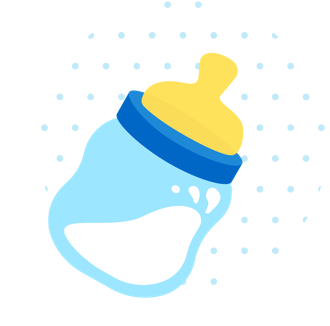Breastfeeding is best for babies
Thank you for visiting our website. The content is only for healthcare professionals so we cannot grant you access.
Please read this important notice first
By clicking the continue button, you will be able to view information about Similac infant milks and other products. If you choose to proceed, you are accepting that Similac is supplying this information at your individual request for information purposes. Please consult a healthcare professional to make an informed choice on feeding your baby milks & weaning onto solid foods.
Breastfeeding is best for babies and provides many benefits. It is important that, in preparation for and during breastfeeding, you eat a healthy, balanced diet. Combined breast and bottle feeding in the first weeks of life may reduce the supply of your own breast milk, and reversing the decision not to breastfeed is difficult. The social and financial implications of using an infant milk should be considered. Improper use of an infant milk or inappropriate foods or feeding methods may present a health hazard. If you use an infant milk, you should follow manufacturer’s instructions for use carefully – failure to follow the instructions may make your baby ill.
I do not wish to continue
Choosing the right baby formula
Nutrition plays a huge role in the mental and physical development of your child during their early months and years. Breast milk is the best source of nutrition for a baby in the first year of their life, however, if breast milk is insufficient or breastfeeding is not possible, you should carefully approach the choice of formula for your baby. The introduction of formula milk to your child’s diet should only be considered after speaking to a health professional, e.g. your midwife, doctor or health visitor.
Choosing a baby formula can be confusing for parents as it is vital that your baby receives all the nutrients needed for essential growth and development. This is why consulting a health professional is so important and why, if you would like to do some personal research, we hope that the following information is useful.


What kinds of formulas are there?
The most common types of formula are ‘first infant’’ and ‘follow-on‘. First infant formulas are intended for newborn babies up to the age of six months. Their composition supports the physiological needs, metabolism and digestion in the first six months of a child’s life. Follow-on formulas are designed for children aged six months and over, they should never be fed to babies under 6 months old.
Formulas marked ‘from 0 to 12 months‘ can be used throughout the entire first year of a child’s life, however, due to the wide range of first infant and follow-on formulas, these are less popular. In addition to the age of the baby, their general health will affect the choice of the formula.
Children with a high risk of allergies should be prescribed a hypoallergenic formula - in these products, cow's milk proteins are split into smaller fragments, and as a result they become easier for your baby to digest.
Babies with intolerance to lactose should be prescribed low or lactose-free formulas. In this case, the lactose is removed or its content is significantly reduced.
Children suffering from regurgitation are often prescribed anti-reflux formulas. These are special milks containing thickeners, which reduces the chance of reflux.
When there are so many formula choices available it’s helpful to understand how to choose the right one for your baby. Here’s our guide to helping you make that decision.
Consult a healthcare professional
Consultation with your dedicated healthcare professional is useful for all parents, regardless of the health of your baby. A specialist can provide you with all the information you need to choose a formula for your child - in particular, which ingredients are key to your baby’s health and wellbeing.
Carefully study the composition of the baby formula
Manufacturers are constantly working to improve the composition of infant formula, with the help of various ingredients, to bring them closer to the characteristics and properties of breast milk. To see how one formula differs from another, you need to compare their compositions and also learn as much as possible about the properties of their ingredients.

Which ingredients should you pay special attention to?
About 1/5 of all fatty acids in breast milk are palmitic acid. Palmitic acid is also found in palm oil, which is why some companies choose to add it to their baby formula. However, fat molecules (triglycerides), within palmitic acid in palm oil and breast milk differ in structure and are not absorbed in the same way by your baby.
Fatty Acids
Omega-3 and Omega-6 fatty acids are essential for the healthy growth of cells and tissues in a young baby. They are also important for healthy brain development. When formulas contain these healthy fats, a slight fishy odor is possible when opening the packaging, this quickly goes away and is not present in the diluted formula.
Observe how your baby reacts to the formula
Once you have chosen a formula, watch how your baby reacts to it for the first time. If they seem happily satisfied and are not fussy afterwards, then you’ve made the right choice. If your baby has an allergic reaction or other serious symptoms, you should immediately consult a doctor who will determine the cause of these symptoms and advise on correct nutrition going forward.
In summary, here are our recommended steps to choosing the correct formula for a happy and healthy baby:
- Consult with a healthcare professional to determine the type of formula you need, which will depend on your baby’s age and health.
- Explore existing formulas, the formula should ensure comfortable digestion based on its ingredients.
- When looking at the ingredients of a new formula, look out for fatty acids as these are essential for your baby’s healthy growth.
- Monitor how your baby reacts to the selected formula, if there are any problems then consult your doctor immediately.
In preparing the article, the following materials were used:
‘Types of formula milk -Your pregnancy and baby guide’ NHS England website 2020
"The National Program for the Optimization of Feeding of Children of the First Year of Life in the Russian Federation." Moscow, 2011.
Nutrition of a healthy and sick child. A manual for doctors edited by V.A. Tutellana, I.Ya. Horse. Moscow, 2014.

Similac® Support
Friendly advice at your fingertips

This website and the information contained herein is intended for use by residents of the UK. The product images are for illustrative purposes only.
©2024 Abbott Laboratories Limited. All rights reserved. Registered Number: 329102 England Registered Office: Abbott House, Vanwall Business Park, Vanwall Road, Maidenhead, Berkshire SL6 4XE
Date of preparation: August 2020









